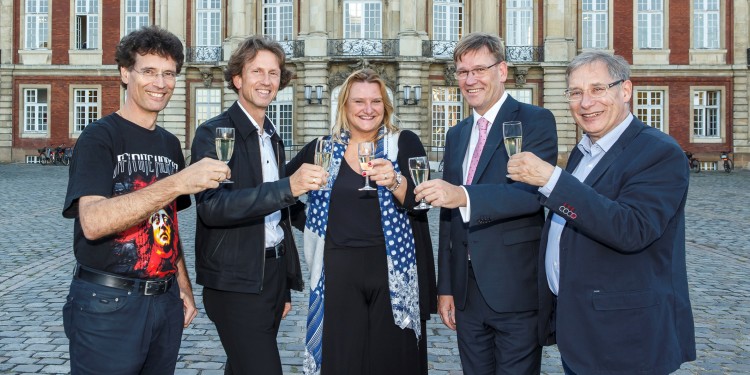
Excellence Strategy: Major success for the University of Münster
A decision has been reached in the first funding line, “Cluster of Excellence”, in the Excellence Strategy being pursued by the national and state governments in Germany. In the competition, the University of Münster was successful with two of the three Cluster applications it submitted. The announcement was made today, September 27, by the Excellence Commission in Bonn. “This is a major success – for every single researcher involved and for the University as a whole,” said Prof. Johannes Wessels, the Rector of the University. “It means that once again we have demonstrated that we are one of the most research-intensive universities in Germany. On the basis of today’s decision, we will continue to sharpen our profile. Our students will also benefit from this in the teaching they receive. I am delighted that the effort and commitment displayed by everyone involved have paid off.”
The following Clusters of Excellence will receive funding for a period of seven years, with effect from 1 January 2019: “Religion and Politics. Dynamics of Tradition and Innovation” and “Mathematics Münster. Dynamics – Geometry – Structure”. The application submitted by the “Cells in Motion. Multiscale Imaging to Understand Dynamic Cell Behaviour in Organisms” Cluster of Excellence was eliminated during the assessment process.
“The demanding applications procedure and the exceptionally strong competition confirm that the University of Münster is an excellent location,” added Prof. Monika Stoll, University Vice-Rector for Research. “We very much regret that the “Cells in Motion” Cluster application was not approved. The fields of research within the Cluster will continue to play an important role at the University of Münster in future.”
Because the minimum two Clusters have been approved, the University of Münster can submit an application on December 10 to receive funding as a University of Excellence. The aim of this scheme is to strengthen individual universities as a whole on the basis of successful Clusters of Excellence. “Today’s success does of course give us a boost in making this application – which we are already hard at work on,” comments Johannes Wessels. “And it instils in us a large dose of optimism.” The decision on this funding line will be announced on 19 July 2019.
Information on the Clusters:
Since 2007, the Cluster of Excellence “Religion and Politics” investigates the complex relationship between religion and politics across eras and cultures. The Cluster will focus its work in the new funding phase on the question of how religion can stimulate, contain and modify societal and political debates, where the dynamic potency of religion lies, and which external conditions encourage or limit its ability to mobilize people. Spokesperson of the Cluster of Excellence is sociologist of religion Prof. Detlef Pollack. The overall funding is about 41 Million Euros.
The cluster of excellence “Mathematics Münster” focuses on the problem oriented development of comprehensive dynamic, geometric and structural techniques. This tackles fundamentally important mathematical problems in three major research areas, namely Arithmetic and Groups (A), Spaces and Operators (B), and Models and Approximations (C). The spokespersons of the cluster are Prof. Christopher Deninger and Prof. Mario Ohlberger. The overall funding is about 28 Million Euros.
The “Cells in Motion” Cluster is to receive bridge financing until October 2019 in order to complete ongoing research projects. In the last six years the Cells-in-Motion Cluster has broken down traditional barriers between different disciplines of the life and natural sciences, and it has broadened the imaging infrastructure to understand dynamic cell behaviour in organisms. Interdisciplinarity will continue to be integral to research and training at Münster University by the Cells-in-Motion Interfaculty Centre and the new research building Multiscale Imaging Centre. The task is now to look at what opportunities there are to continue the successful work being done in the Cluster on another basis.
Background details:
The Excellence Strategy is a continuation of the Excellence Initiative set up in 2005 and serves to strengthen top-level research at German universities. The programme consists of two funding lines: Clusters of Excellence and Universities of Excellence. At the beginning of this year, 41 universities submitted 88 Cluster of Excellence applications to the German Research Foundation (DFG). Today, the DFG and the German Council of Science and Humanities (Wissenschaftsrat) announced that a total of 57 projects from 34 universities are being awarded funding amounting to 385 million euros per annum. Successful universities with the minimum two approved Clusters of Excellence can apply to be awarded the title of “University of Excellence” in the second funding line.
